- Home
- Anthony Burgess
Enderby's Dark Lady
Enderby's Dark Lady Read online
Enderby's Dark Lady
Anthony Burgess
"A brilliant and breathless performance…vintage Burgess… The whole performance stuns." – The Boston Globe
"Readers will howl with laughter – a wickedly amusing book." – The Atlantic Monthly
"Resurrected by popular request… Enderby the poet stalks about in this fourth Enderby novel, the mouthpiece, as usual, of his author's concern for language and sardonic, sometimes sour appraisal of modern popular culture… Burgess displays the uncanny ear for dialect for which he is noted and, with customary bravado, opens and closes his story with Will Shakespeare himself." – Publishers Weekly
"Enderby / Burgess is an absolutely hilarious and sage observer of people, language and life: There are at least a dozen moments in this short book which will make you laugh out loud." – San Francisco Examiner-Chronicle
"Enderby is one of Burgess' funniest literary inventions, combining verbal virtuosity with world-class eccentricity." – Houston Post
"Literate, funny and smart." – Playboy
"Here is a writer who can make the plausible comic and the comic plausible. In the process he enriches our sense of what it means to enjoy life." – San Diego Union
Anthony Burgess
Enderby's Dark Lady (Or: No End to Enderby)
Book 04 of the Enderby Quartet
Composed to placate kind readers of
The Clockwork Testament, or Enderby's End,
who objected to my casually killing
my hero
A Prefatory Note
Enderby first got into my head in early 1959, when I was a colonial civil servant working in the Sultanate of Brunei, North Borneo. One day, delirious with sandfly fever, I opened the door of the bathroom in my bungalow and was not altogether surprised to see a middle-aged man seated on the toilet writing what appeared to be poetry. The febrile vision lasted less than a second, but the impossible personage stayed with me and demanded the writing of a novel about him. I wrote half this novel in 1960, a year in which the medical authorities had condemned me to death with an inoperable cerebral tumour. It did not appear that there would be time to write the second part of the novel, so I published the first part as a whole book under the title of Inside Mr Enderby. To the chagrin of the doctors, who did not like their prognosis to be proved false, I lived and was able, in 1967, to write the second part of the novel, under the title of Enderby Outside. A few years later Enderby demanded that he be killed off in a novella entitled The Clockwork Testament. I duly murdered him with a heart attack. Now, in this new brief novel, he is alive again. It seems that fictional characters, though they sometimes may have to die, are curiously immune to death. Is Don Quixote dead or alive? Is Hamlet? Is Little Nell? Enderby's demand to be resurrected has come inconveniently, for I am engaged on a longish novel about Nero and St Paul.
A decent respect to people's notions of plausibility demands that I try to explain why Enderby, having died of a heart attack in New York about ten years ago, should be alive three years later in the state of Indiana. (And why Indiana, a part of the United States I do not know very well?) I think we have to look at it this way: all fictional events are hypotheses, and the condition of Enderby's going to live in New York would be that he should die there. If the hypothesis is unfulfilled, he does not have to die. Enderby was condemned to visit the United States, there to suffer, and there was a choice between his going to Manhattan to teach Creative Writing and his being employed to write the libretto for a ridiculous musical about Shakespeare in a fictitious theatre in Indianapolis. He took the second course, which involved his staying alive to risk a suicidal identification (himself with the Bard) but to come through unscathed. He will, of course, eventually die, but only because his creator will die. On the other hand, being a fictional character, he cannot die.
Enderby's name comes from two sources – the remote and uninhabitable Antarctic territory called Enderby Land, and a poem about a shipwreck by Jean Ingelow in which church bells clang out a tune called "The Brides of Enderby". His poems are, inevitably, written by myself, but only myself in disguise as Enderby. A reviewer in Punch said, of the first novel or half-novel, "It would be helpful if Mr Burgess could indicate somewhere whether these poems are meant to be good or bad," a fine instance of critical paralysis. T. S. Eliot liked at least three of the poems, but posterity is beginning to find his taste unsure, especially since he too, like Enderby, became the librettist for a Broadway musical. I have no opinion about either Enderby's poems or Enderby himself. I do not know whether I like or dislike him; I only know that, for me, he exists. I fear that he may probably go on existing.
A. B.
Lugano, November 1983
1
Will and Testament
When Ben Jonson was let out of jail he went straight to William Shakespeare's lodgings in Silver Street and said: "Let us drink."
"Ben," Will cried. "Your ears are untrimmed and your nose whole. The shearers were held off, then. I'm glad to see you well."
"But thirsty. Let us go and drink."
"We can drink here and shall. Malmsey? Sherrisack? Or shall I send out for ale? Ben Ben Ben, have a care. Next time the shearer may be the ultimate trimmer, the sconce-chopper as they call him."
"I've a mind to drink in a tavern. Let us go."
"As you will, this being a sort of great day for you. How was it in jail? Are Marston and Chapman there yet?"
"There still and like to stay. After all, the offending line was of their making. As for the jail – stink, maggots, rats, lepers, pocky chancres. But there was a man I will tell you of while we drink."
"You swore to me the line was your line, the best line in the whole of Westward Ho as you would have it. How does it go now? 'The Scotch -' It begins with 'The Scotch -'."
"Eastward Ho is the title. You look as ever the wrong way. Back when the rest of us look forward. It is this: 'The Scotch are good friends to England, but only when they are out of it.' Well, indeed I wrote it, but it seemed politic to father it on the other two. Under oath, aye, but a poet could not live did he not perjure." They went down the stairs and past the workshop of the tiremaker Mountjoy, Will's landlord. Mountjoy was scolding, in Frenchified English, the apprentice Belott.
"Immortal," Will said. "He can never say that I did not make him immortal. But no gratitude there."
"How immortal?"
"I have him in Harry Five as the herald."
"He taught you the dirty French for the same?"
"He put right the grammar. I knew the dirt already." Out in Silver Street, which the sun had promoted to gold, they saw beggars, limbless soldiers, drunken sailors, whores, dead cats, ordinary decent citizens in stuff gowns, a kilted Highlander with a flask of usquebaugh in place of a sporran. A ballad singer with few teeth sang:
"For bonny sweet Robin was all my joy,
And Robin came oft to my bed.
But Robin did wrong, so to end his song
The headsman did chop off his head."
"An old one," Ben said. "And still I cannot hear it without a shudder."
"It seems older than it is. A great deal has happened in the interim. Poor Robin."
"That was your name for him? You called him Robin to his face?"
"He was Robin to my lord of Southampton, and my lord of Southampton was ever Harry to me. So it was always out-upon-titles. But, he was ever saying, when he was become King Robert the First of England there would be no familiarity then. Would it had been so, sometimes I think, though bloodless, bloodless."
"Treason, man, careful."
"What will you do, report me to Gobbo Cecil? 'An't please you, good my lord, there is this low playmaker that doth say how the Essex rebellion should have
succeeded.' He'll say, 'Aye aye, and maybe he's in the right of it.' He's no love for slobbering Jamie with his bishops and buggery and drinking tobacco is an unco foul sin to the body, laddie, and doth inflame the lung, if thou lovest tobacco then lovest thou not thy king."
Ben sighed. "I know how it is. I say too many Scotchmen about and I am flung in jail. You could tell the king to his face that he's a – I say no more, you see that sour man in black there? Following us, is he? Nay, he turned off. You could skite in his majesty's mouth and he'd say, 'Aye, I do dearly love a guid witty jest, laddie, will ye be raised to a Knicht o' the Garrrterrr?' Some men are born jail meat. Others – Here, round here. At the bottom of this lane. Go tipatoe, 'tis all slime underfoot. Careful, careful."
"The Swan with Two Necks." Will read the warped sign with a fastidious nose-wrinkle. "This is not a tavern I mind ever to have visited before."
"It is quiet," Ben said, leading the way into noise, stench, striding over a vomit pool, between knots of swarthy men with daggers. "We can talk in peace and quiet." They sat on a settle before a rickety much-punished table whereon fat flies fed amply from greasy orts and a sauce-smear unwiped. A girl with warty bosom well on show showed black teeth and took an order for wine. "Red wine," Ben said. "Of your best. Blood-red, red as the blood of our blessed Saviour." Some villains turned to look with surly interest. A man with an eyepatch nodded as in friendly threat at Ben. "Buenos días, señor," Ben said.
"For God's sake, Ben, what manner of place is this?"
"A good place, though something filthy. Good fellows all, though but rogues to look on. Now let me speak. A great change is come into my life."
The wine arrived. Will poured. "Change? You have fallen in love with some pocked tib of the Clink and think her to be a disguised angel?"
"Ah, no. By heaven, this is good wine, red, aye, red as the blood that is decanted daily on the blessed holy altars of the one true faith."
"For Christ's sake, Ben."
"Aye, for Christ's sake, you say truly. What I do I do for Christ's dear sake. Let me tell you, my dear friend, what befell. In this noisome stinking rathole behold the word of the Lord came to me."
"Oh Jesus the word of the."
"Aye, a good old priest of the true faith, aye, though earning his bread as a dancing-master, thrown into jail for debt, spake to me loving words and told where the truth doth lie. It was by way of being in the manner somewhat of a revelation." Ben drank fiercely and then said: "Good wine. Enim calix sanguinis. Drink a salute to my holy happiness."
"Keep your voice well down, man," Will said, his voice well down. "See how they all listen."
"They may listen and be glad. I have friends, have I not? Have I not friends here?" he called to the drinkers. "Amigos? There was no response save for a man hawking, though all looked still.
"I am getting out of here," Will said.
"Aye, ever the prudent. Well, there is another word for prudent and you know it well. A plague on all cowards. Why should I not speak aloud my joy in being restored to the one true holy bosom? Is not the Queen's self of the blessed company? I tell you, the day is at hand when we may take the holy body in sunlight before the eyes of all men, not skulking in a dark hole. Hallelujah."
"You know the danger, fool," Will said, sweating. "There was an expectation of tolerance, but it is not fulfilled. The bishops will see it is not. Let us be out of here."
"With this blessed red wine unfinished? With this blood of the grape crimson as the blood of."
"I am going." Will drained the sour stuff and turned down his cup with a clank.
"Well, well, very well, I have told my story. Now, thanks be to God, my true story doth begin." Ben drank straight from the jug, beastlily, emerging spluttering. He wiped his mouth with the dirty back of his hand and nodded in a friendly manner at the company. "Give you good day, all. And God's blessing be ever on your comings and goings and eke your staying where you are."
"Come, idiot."
They left. Ben said, "Aye, aye, we will see how the spirit works. Is anyone following?"
"None. None yet. Do you wish someone to follow?"
"I say no more of it now, Ben Jonson his conversion. Except that you may speak of it to your friends and colleagues and all you will. I care not. I dare all for the lord Jesus. I owe him a death."
"That is mine. I wrote that."
"You did? It is all one. There is a tale they tell of you, do you know that?"
"What tale? Where?"
"Jack Marston told me. It is of Master Shakespeare dead and ascending to heaven's gate and demanding admittance. St Peter says: We have too many landlords here, we need poets to sweeten long eternity. Well, says Master Shakespeare, I am well known to be a poet. Prove it, says St Peter. I am of poor memory, says Master S, and can remember no line I wrote. Well then, says heaven's warder, extemporize somewhat. At that moment within the gates and all visible from the threshold little bow-legged Tom Kyd goes by, a poetic martyr, with his fingers cruelly broke by the late Queen's Commissioners. A bow-legged one, says the saint. Extemporize on him. Whereupon, firequick, Master S comes out with:
"How now, what manner of man is this
That beareth his balls in parenthesis?"
"Whereupon St Peter sighs and says: We have no room for landlords."
"Not funny," Will said. And then: "So they talk of me as dead already, do they?"
"Not dead. Shall we say retired. Your sun setteth. Westward Ho is your cry." Ben looked behind him to see two daggered ruffians following. He said in some small excitement: "Leave me here. Take your leave, aye. I think there are two coming who will show me where I may hear mass Sundays and saint-days. The blessing of Mother Church on you, Will."
"No, no, I want no such blessing."
It was some week or so later that Ben Jonson sat at dinner with new friends, the room being an upper one in Eastcheap. There was Bob Catesby at the head of the table, very fierce and sober, and a swarthy one that had been in that low tavern that time they called Guy though his true name was Guido, somewhat drunk on Spanish wine, and there were Rob Winter, little big-eyed Bates, Kit Wright, Tom Winter brother of Rob, and also Frank Tresham who kept wetting a dry lip and looking shifty. Catesby said to Ben:
"You are wide open, Master Jonson. Your days are numbered."
"By whom?" Ben said. "If you mean that I blab of the brotherhood, by God you are mistaken."
"You have not done that, no, you have been prudent enough there. If you had not been so, Guy here – a soldier, remember, who will cut off ten heads before his breakfast – Guy, I say, would have had you, by God. No, I mean imprudent in that you talk too much of the Godless King and the runagate Queen, who will show her bosom and legs to all and go to mass hiccuping with the drink. I mean treasonable talk. I believe you are destined for a martyr's crown."
"No," Ben said. "I want not that. I will not force apart the jaws of heaven for my precocious entering. Heaven may open in its own good time without my prompting. There is wine for the drinking yet and wenches for the fondling. Nay, no martyrdom."
"Speak out the scheme, Rob," Catesby said to Tom Winter's brother. "You are he that must hold it in his memory. You are our living parchment."
"Well, then," Rob Winter said, looking at Ben, "it is this. It is to do with the new session of the parliament. All will be there – King, Queen, Prince Henry, nobles, judges, knights, esquires and all, all for the forging of new acts and laws to put down the true faith. They will be blown up."
"They will be -?" Ben asked carefully.
"Blown up. We are to place twenty barrels of gunpowder in the cellar beneath with faggots on top. Set but flame to the faggots and there will be a greater blowing up than has ever before been seen in the long tale of tyranny and human suppression."
"Blown up," Catesby said after a pause, as to make sure Ben properly understood.
"The Queen," Ben said, "is of the true faith. Is it right she too should be blown up?"
"You are always read
y to talk of her Godlessness," Catesby said. "Well, she will be punished. Alternatively, she will be a martyr. Destiny puts forth a choice."
"However you gloss it," Ben said, "she will be blown up."
"Everybody will be blown up," Tom Winter said, pausing in the picking of his teeth. They had eaten of a roast ham, each mouthful full of teeth-hugging fibres. "Everybody."
"And then there will be a new era of love for the true faith?" Ben asked.
"We will think of that after the blowing up," Catesby said. "Certainly there will be a many problems, but sufficient to the day as the Gospel saith. First the blowing up."
"And the choice of the one to whom shall be given the glory of setting flame to the faggots for the blowing up," Kit Wright said. They all now looked at Ben.
"He too will be blown up?" Ben asked.
"There is every likelihood that he will be blown up," Catesby said. "But he will at once be endued with a crown of martyrdom. You, Master Jonson, are wide open." They all continued to look at Ben. Ben said:
"How first are you to convey the barrels to the cellar?"
"It is a wine cellar," Rob Winter said. "The barrels will be brought on a vintner's dray. What have you there, the guards will ask. Wine, will come the answer. Wine, as hath been ordered. It is all very simple."
"And the faggots?"
"The faggots will be in another barrel, dry and ready for the laying on. And he that is to do the brave deed will go as a guard in a borrowed livery. Bearing a torch."
"In broad daylight?" Ben asked.
"He will say he has orders to search the cellar for possible treasonous men lurking. It is all very simple."
Francis Tresham now spoke. "I am against it," he said. "It is a plot of some cruelty. Also of some injustice. The Queen, true, is a foreigner and doth not matter. But there are enow good Catholic Englishmen in hiding among those of the parliament. We are blowing up our own."

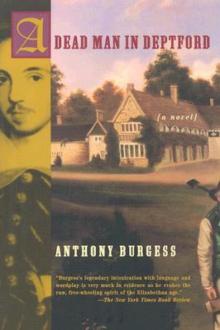 A Dead Man in Deptford
A Dead Man in Deptford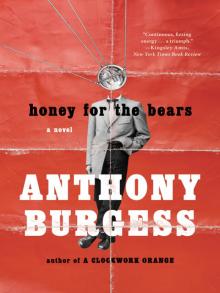 Honey for the Bears
Honey for the Bears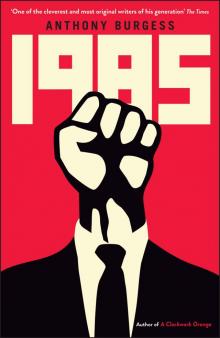 1985
1985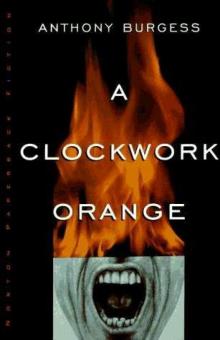 A Clockwork Orange
A Clockwork Orange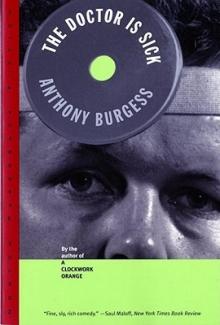 The Doctor Is Sick
The Doctor Is Sick Earthly Powers
Earthly Powers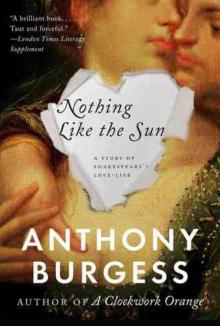 Nothing Like the Sun
Nothing Like the Sun Collected Poems
Collected Poems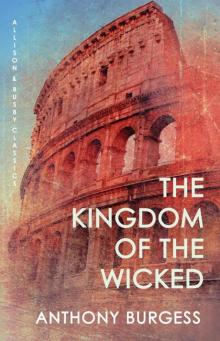 The Kingdom of the Wicked
The Kingdom of the Wicked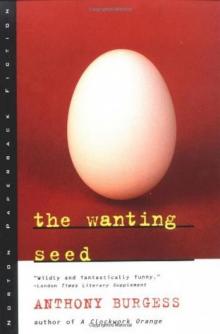 The Wanting Seed
The Wanting Seed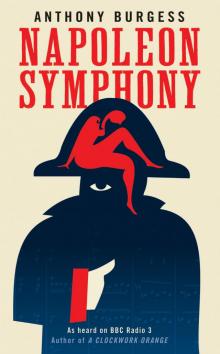 Napoleon Symphony
Napoleon Symphony The Malayan Trilogy
The Malayan Trilogy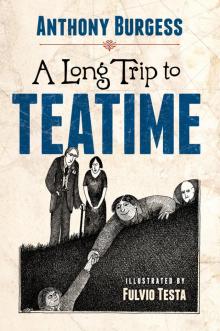 A Long Trip to Teatime
A Long Trip to Teatime Enderby Outside
Enderby Outside M/F
M/F The Complete Enderby
The Complete Enderby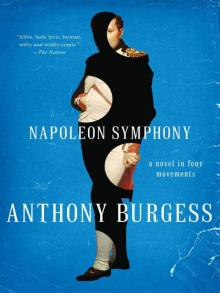 Napoleon Symphony: A Novel in Four Movements
Napoleon Symphony: A Novel in Four Movements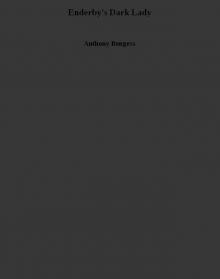 Enderby's Dark Lady
Enderby's Dark Lady The Clockwork Testament (Or: Enderby 's End)
The Clockwork Testament (Or: Enderby 's End) ABBA ABBA
ABBA ABBA A Clockwork Orange (UK Version)
A Clockwork Orange (UK Version)